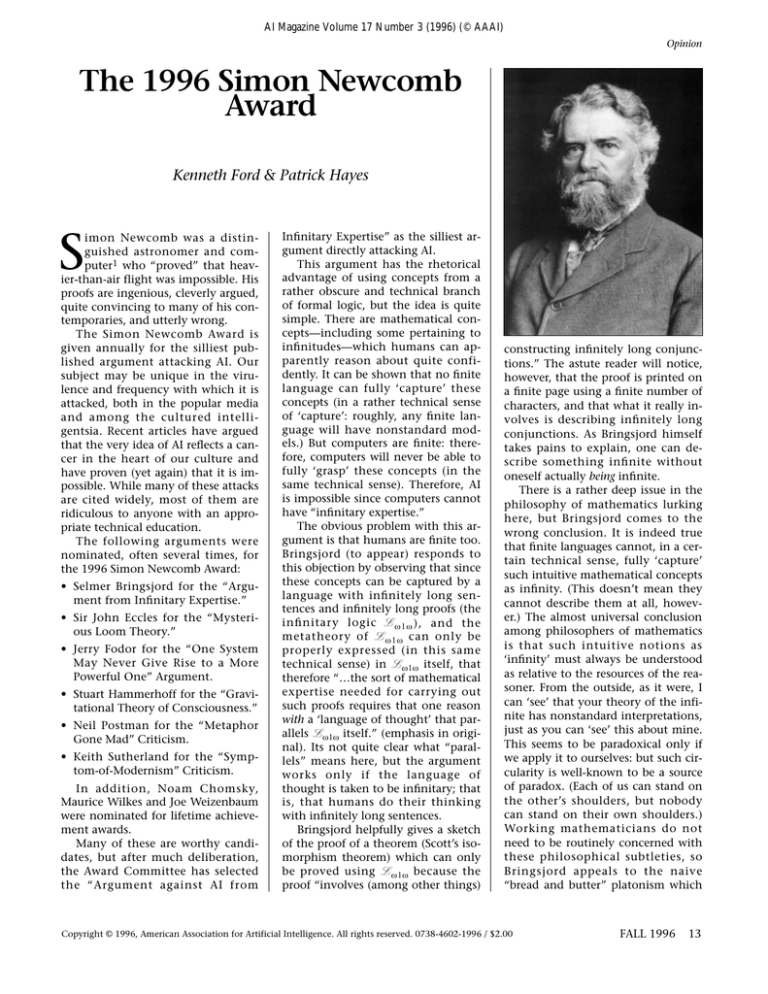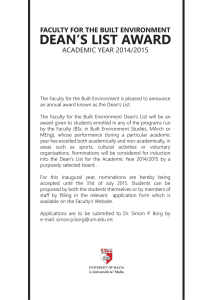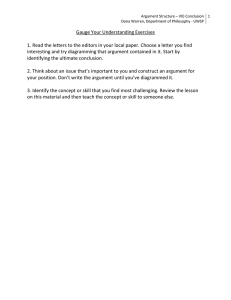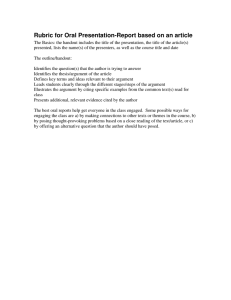
AI Magazine Volume 17 Number 3 (1996) (© AAAI)
Opinion
The 1996 Simon Newcomb
Award
Kenneth Ford & Patrick Hayes
S
imon Newcomb was a distinguished astronomer and computer1 who “proved” that heavier-than-air flight was impossible. His
proofs are ingenious, cleverly argued,
quite convincing to many of his contemporaries, and utterly wrong.
The Simon Newcomb Award is
given annually for the silliest published argument attacking AI. Our
subject may be unique in the virulence and frequency with which it is
attacked, both in the popular media
and among the cultured intelligentsia. Recent articles have argued
that the very idea of AI reflects a cancer in the heart of our culture and
have proven (yet again) that it is impossible. While many of these attacks
are cited widely, most of them are
ridiculous to anyone with an appropriate technical education.
The following arguments were
nominated, often several times, for
the 1996 Simon Newcomb Award:
• Selmer Bringsjord for the “Argument from Infinitary Expertise.”
• Sir John Eccles for the “Mysterious Loom Theory.”
• Jerry Fodor for the “One System
May Never Give Rise to a More
Powerful One” Argument.
• Stuart Hammerhoff for the “Gravitational Theory of Consciousness.”
• Neil Postman for the “Metaphor
Gone Mad” Criticism.
• Keith Sutherland for the “Symptom-of-Modernism” Criticism.
In addition, Noam Chomsky,
Maurice Wilkes and Joe Weizenbaum
were nominated for lifetime achievement awards.
Many of these are worthy candidates, but after much deliberation,
the Award Committee has selected
the “Argument against AI from
Infinitary Expertise” as the silliest argument directly attacking AI.
This argument has the rhetorical
advantage of using concepts from a
rather obscure and technical branch
of formal logic, but the idea is quite
simple. There are mathematical concepts—including some pertaining to
infinitudes—which humans can apparently reason about quite confidently. It can be shown that no finite
language can fully ‘capture’ these
concepts (in a rather technical sense
of ‘capture’: roughly, any finite language will have nonstandard models.) But computers are finite: therefore, computers will never be able to
fully ‘grasp’ these concepts (in the
same technical sense). Therefore, AI
is impossible since computers cannot
have “infinitary expertise.”
The obvious problem with this argument is that humans are finite too.
Bringsjord (to appear) responds to
this objection by observing that since
these concepts can be captured by a
language with infinitely long sentences and infinitely long proofs (the
infinitary logic L ω1ω ), and the
metatheory of L ω1ω can only be
properly expressed (in this same
technical sense) in Lω1ω itself, that
therefore “…the sort of mathematical
expertise needed for carrying out
such proofs requires that one reason
with a ‘language of thought’ that parallels Lω1ω itself.” (emphasis in original). Its not quite clear what “parallels” means here, but the argument
works only if the language of
thought is taken to be infinitary; that
is, that humans do their thinking
with infinitely long sentences.
Bringsjord helpfully gives a sketch
of the proof of a theorem (Scott’s isomorphism theorem) which can only
be proved using L ω1ω because the
proof “involves (among other things)
constructing infinitely long conjunctions.” The astute reader will notice,
however, that the proof is printed on
a finite page using a finite number of
characters, and that what it really involves is describing infinitely long
conjunctions. As Bringsjord himself
takes pains to explain, one can describe something infinite without
oneself actually being infinite.
There is a rather deep issue in the
philosophy of mathematics lurking
here, but Bringsjord comes to the
wrong conclusion. It is indeed true
that finite languages cannot, in a certain technical sense, fully ‘capture’
such intuitive mathematical concepts
as infinity. (This doesn’t mean they
cannot describe them at all, however.) The almost universal conclusion
among philosophers of mathematics
is that such intuitive notions as
‘infinity’ must always be understood
as relative to the resources of the reasoner. From the outside, as it were, I
can ‘see’ that your theory of the infinite has nonstandard interpretations,
just as you can ‘see’ this about mine.
This seems to be paradoxical only if
we apply it to ourselves: but such circularity is well-known to be a source
of paradox. (Each of us can stand on
the other’s shoulders, but nobody
can stand on their own shoulders.)
Working mathematicians do not
need to be routinely concerned with
these philosophical subtleties, so
Bringsjord appeals to the naive
“bread and butter” platonism which
Copyright © 1996, American Association for Artificial Intelligence. All rights reserved. 0738-4602-1996 / $2.00
FALL 1996
13
Opinion
evident silliness of the argument, we
are especially pleased to award the
1996 Simon Newcomb Award to the
logician, philosopher, programmer
and novelist, Professor Selmer
Bringsjord.
The Simon Newcomb Award Committee wishes to thank all those who
have expressed encouragement and
support (including Dr. Dobb’s Journal)
and especially those who made nominations for this year’s award.
Submission Requirements
makes mathematical intuition seem
like revealed truth. This is rather like
relying on naive realism to provide a
proper account of perception.
Further discussion of these matters
deserves a book-length discussion in
the philosophy of mathematics,
which would take us beyond the spirit of these Awards. Suffice it to say
that the argument, stripped of its sophisticated clothing, amounts simply
to the claim that human mathematicians have infinitely long sentences
in their heads. This is a genuinely
new argument. Penrose, an earlier recipient of the Award, asserts that
mathematicians have “direct access”
to infinite Platonic things, but he
doesn’t venture to claim that one
small head can actually contain an
infinite piece of mental text.
For all these reasons, as well as the
14
AI MAGAZINE
Nominations are welcomed for the
1997 Simon Newcomb Award. Please
send nominations by email to
phayes@ai.uwf.edu and kford@ai.uwf.
edu. Since the Award is to be given for
a particular argument, nominations
should give a brief description of the
argument, a reference to its place of
publication, and the name and affiliation of the nominee. Permission of
the nominee is not required.
An argument can win an Award
only once, so repetitions of previous
award-winning arguments are not acceptable unless they display some
new significant variation on the original theme. If it is necessary to explain why the argument is silly, it
may not be silly enough. The best arguments are those that a graduate
student in computer science might
find hilarious. And finally, silly arguments within AI are not eligible for
the award, only attacks on AI. Obviously, it would not be practical to
give an award for every silly argument in AI.
Bibliography
Bringsjord, S. (to appear). “An Argument for the Uncomputability of
Infinitary Mathematical Expertise,”
in Feltovich P. , Ford K. and Hoffman
R., eds., Expertise in Context. Menlo
Park, CA: AAAI Press. (A version is also available at: http://www.rpi.
edu/~brings/inf.exp.3b.ps)
Note
1. In the late 19th century, the ability to
perform numerical computations quickly
and accurately was a rare skill requiring
native talent and many years of teaching
and training; computers were respected
intellectual craftsmen.
Case-Based
Reasoning:
Experiences,
Lessons, &
Future
Directions
Edited by David B. Leake
This book presents a selection of recent progress, issues, and directions
for the future of case-based reasoning. It includes chapters addressing
fundamental issues and approaches
in indexing and retrieval, situation
assess-ment and similarity assessment, and in case adaptation.
Those chapters provide a “casebased” view of key prob-lems and
solutions in context of the tasks for
which they were developed. It also
presents lessons learned about how
to design CBR systems and how to
apply them to real-world problems.
The final chapters include a perspective on the state of the field and
the most important directions for
future impact. The case studies presented involve a broad sampling of
tasks, such as design, education, legal
reasoning, planning, decision support, problem-solving, and knowledge navigation. In addition, they
experimentally examine one of the
fundamental tenets of CBR, that
storing experiences improves performance. The chapters also address
other issues that, while not restricted
to CBR per se, have been vigorously
attacked by the CBR community, including creative problem-solving,
strategic memory search, and opportunistic retrieval. This volume provides a vision of the present, and a
challenge for the future, of casebased reasoning research and applications.
ISBN 0-262-62110-X
450 pp., index. $39.95 softcover
To order call toll free
800/356-0343 or 617-625-8569
The AAAI Press/ The MIT Press






